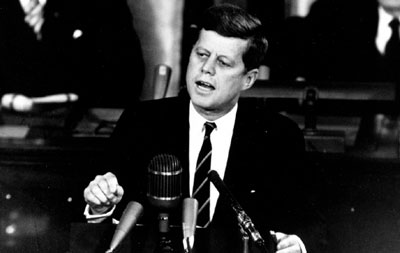The enigma of presidential “space” politicsby Chris Carberry
|
| Apollo was unquestionably spectacular and historic, but the Apollo model is decidedly not a model we should try to—or even can—replicate in our current age. |
We all want presidential leadership, but we can’t wait for a “magical presidential moment” that may never come again. In reality, the success of Kennedy’s speech was almost completely dependent on a particular moment in time and political (and other) circumstances that occurred in the 1960s. If Kennedy made a comparable speech today, it would likely be no more successful than other less famous presidential space speeches.
Apollo was unquestionably spectacular and historic, but the Apollo model is decidedly not a model we should try to—or even can—replicate in our current age. First of all, the Apollo Program proved to be an unsustainable model. There was only one official reason for going to Moon—to beat the Soviet Union in a race—but once that goal was achieved, there was no politically compelling reason to continue. The 1960s was also a time when the nation was willing and able to spend upwards of four percent of the federal budget on that program. The allocation of such a significant portion of the federal budget to the Apollo Program was possible only because the race to the Moon was seen as an important component of the battle for global dominance between the superpowers. A similar geopolitical dynamic is unlikely to happen again. We also can’t discount the power of need—that is, the need of the nation to get to the Moon before that decade was out in order to fulfill the dream of our fallen leader. The country felt obligated to land humans on the Moon to honor John F. Kennedy.
There is always great hope in the space community that candidates will embrace space exploration in the next campaign, but history has shown that when space exploration enters the campaign dialogue, it often hasn’t gone well. Newt Gingrich learned this when he proposed a Moon base and other ambitious plans, which prompted Mitt Romney to state that if Gingrich were one of his employees, he would fire him for suggesting such a plan. And sometimes the space community fights back. When then-Senator Obama suggested that he would take money from NASA to fund science, technology, engineering and math (STEM) education, he quickly backpedaled when he was attacked by space supporters, particularly in the key electoral state of Florida. Unfortunately, there have been few occasions when an open dialogue regarding space exploration has benefited the candidates, or the space exploration cause, during a campaign. Rational discourse on the subject has been elusive.
Yet today we have many positive variables that simply didn’t exist in the 1960s. Private capabilities are blossoming worldwide, international partnerships are likely to play a pivotal role, and there are support networks, advocacy groups, and other mechanisms. As a result, space is far more democratized than in any time in the past. Perennial commercial space advocate Rick Tumlinson may have said it best: “We must be our own Kennedys, set the path ourselves, and do what it takes to make it happen.” This doesn’t necessarily mean that space doesn’t need the President, NASA, or Congress, but we must collectively take on leadership enabling NASA and independent players to proceed. Not everything needs to be dictated from the top. We can create inevitability that can transcend political fluctuations over the upcoming decades.
| The more one tries to replicate past glory, the more one is distracted from new achievements. Collectively, we need to stop waiting for another speech like Kennedy’s and move beyond the Apollo Program. |
Presidential leadership is still important, but government is no longer the only player. NASA still should be the leader in space exploration, but in a manner that will unite, harness, and stimulate all of these players, as it is doing with cargo resupply missions to the International Space Station (ISS) and commercial crew programs. The President, working with Congress, needs to enable that process and provide policy and budgetary consistency.
However, as with the numerous historical efforts to “recreate” the Roman Empire, trying to recapture a moment from the past—such as Kennedy’s Moon speech—will inevitably fail. The more one tries to replicate past glory, the more one is distracted from new achievements. Collectively, we need to stop waiting for another speech like Kennedy’s and move beyond the Apollo Program.
